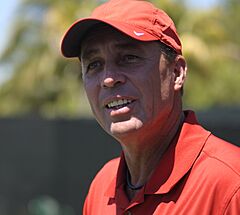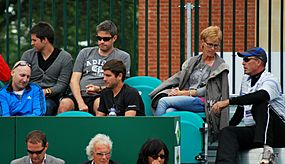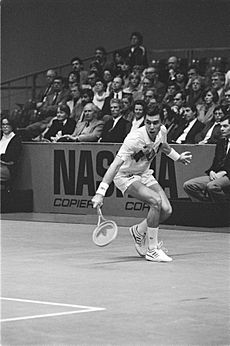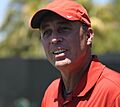Ivan Lendl facts for kids

Lendl in 2012
|
|
| Country (sports) | |
|---|---|
| Residence | Vero Beach, Florida, US |
| Born | March 7, 1960 Ostrava, Czechoslovakia |
| Height | 6 ft 2 in (1.88 m) |
| Turned pro | 1978 |
| Retired | 1994 |
| Plays | Right-handed (one-handed backhand) |
| Coach | Wojtek Fibak (1979-1985) Tony Roche (1985-1994) |
| Prize money | US$21,262,417
|
| Int. Tennis HoF | 2001 (member page) |
| Singles | |
| Career record | 1068–242 (81.5%) |
| Career titles | 94 (4th in the Open Era) |
| Highest ranking | No. 1 (February 28, 1983) |
| Grand Slam singles results | |
| Australian Open | W (1989, 1990) |
| French Open | W (1984, 1986, 1987) |
| Wimbledon | F (1986, 1987) |
| US Open | W (1985, 1986, 1987) |
| Other tournaments | |
| Tour Finals | W (1981, 1982, 1985, 1986, 1987) |
| Grand Slam Cup | SF (1991) |
| WCT Finals | W (1982, 1985) |
| Doubles | |
| Career record | 187–140 (57.2%) |
| Career titles | 6 |
| Highest ranking | No. 20 (May 12, 1986) |
| Grand Slam doubles results | |
| Australian Open | 3R (1984) |
| French Open | SF (1980) |
| Wimbledon | 2R (1985) |
| US Open | 3R (1980) |
| Team competitions | |
| Davis Cup | W (1980) |
| Coaching career | |
|
|
| Coaching achievements | |
| List of notable tournaments (with champion) 2x Wimbledon (Murray) |
|
Ivan Lendl (born March 7, 1960) is a famous former professional tennis player and coach from Czechoslovakia and later the United States. Many people consider him one of the greatest tennis players ever. He was ranked the world No. 1 for 270 weeks, which is the fourth-longest time in history.
Lendl won 94 singles titles during his career. This includes eight major championships called Grand Slams. He won the French Open three times, the US Open three times, and the Australian Open twice. He also won seven year-end championships. He reached the finals of the US Open a record eight times in a row!
Ivan Lendl was known for his powerful playing style. He used a strong forehand shot with lots of topspin. This style helped make aggressive baseline tennis popular. After he stopped playing, he became a coach. He famously helped Andy Murray win three major titles and become the world No. 1 player.
Contents
Tennis Career Highlights
Early Years and Rise to Fame
Lendl grew up in Ostrava, Czechoslovakia (now the Czech Republic). His parents were both top tennis players in their country.
As a junior player, Lendl quickly gained attention. In 1978, he won the boys' singles titles at both the French Open and Wimbledon. He was the world's top-ranked junior player that year.
Lendl became a professional player in 1978. By 1980, he had won seven singles titles. He also helped Czechoslovakia win the Davis Cup that year. He was a key player for his country in team events. However, he stopped playing for Czechoslovakia after moving to the United States in 1986.
In 1981, Lendl won ten more titles. He also won his first major year-end tournament, the Masters Grand Prix. He moved to the United States that same year.
Becoming a Champion
In 1982, Lendl had an amazing year. He won 15 tournaments and had a winning streak of 44 matches. He also won his first World Championship Tennis (WCT) Finals, beating John McEnroe. Lendl's many wins made him the highest-earning tennis player at the time.
Even with all his success, Lendl had not yet won a Grand Slam title. He reached his first Grand Slam final at the French Open in 1981 but lost to Björn Borg. He also lost in the US Open finals in 1982 and 1983, and the Australian Open final in 1983.
Lendl finally won his first Grand Slam title at the 1984 French Open. He had an incredible comeback in the final against John McEnroe, winning after being down two sets. This was a huge moment in his career.
He continued to dominate in the mid-1980s. He won the US Open by beating McEnroe. He then won the French Open again in 1986 and the US Open again in 1986. In 1987, he won his third French Open title and his third straight US Open title.
From 1985 to 1987, Lendl won over 90% of his matches each year. He is the only male tennis player to have a 90%+ winning percentage in five different years. He also reached ten Grand Slam semifinals in a row from 1985 to 1988.
In 1989, Lendl won his first Australian Open title. He reached the US Open final for the eighth time in a row that year, but lost to Boris Becker. Wimbledon was the only Grand Slam title he never won, even though he reached the final twice.
Later Career and Retirement
Lendl stayed a top player into the early 1990s. The 1991 Australian Open final was his last Grand Slam final.
He retired from professional tennis on December 21, 1994, because of ongoing back pain. He had won a total of 94 singles titles. His career prize money was over $21 million, which was a record at the time. In 2001, he was honored by being inducted into the International Tennis Hall of Fame.
Return to the Court and Coaching
Exhibition Matches
After retiring, Lendl played in a few exhibition matches. In 2010, he played against his old rival Mats Wilander. In 2011, he played against John McEnroe at Madison Square Garden. He also played in Prague in 2012.
Coaching Success

On December 31, 2011, Lendl became the coach for Andy Murray. Lendl helped Murray become a more consistent and mature player. With Lendl's guidance, Murray won his first two Grand Slam titles: the 2012 US Open and 2013 Wimbledon Championships. Murray became the second player in the Open Era, after Lendl himself, to lose his first four Grand Slam finals and then win the fifth.
Lendl and Murray stopped working together in 2014 but reunited in 2016. By the end of 2016, Murray had become the world No. 1 player. He won his second Wimbledon title, his third major championship, and his second Olympic gold medal.
Lendl also coached Alexander Zverev from 2018 to 2019. He reunited with Andy Murray for a third time in March 2022. They worked together until November 2023. As of November 2024, Lendl is coaching Hubert Hurkacz.
Playing Style and Training
Lendl was nicknamed "The Terminator" because of his powerful and relentless playing style. He was known for his strength and power, which came from his intense training. He spent many hours practicing on the court and working out.
Lendl was a "baseliner," meaning he played most of his shots from the back of the court. He hit a very strong forehand with heavy topspin. His game was very aggressive and powerful. He was also famous for his detailed and scientific approach to training. For example, he even had the same type of hardcourt surface installed at his home that was used at the US Open.
Equipment Used
Early in his career, Lendl used Adidas clothing and Kneissl rackets. Later, he switched to Adidas rackets. Towards the end of his playing days, he signed with Mizuno in 1990. He used a Mizuno racket designed for him for a short time before returning to his old Adidas racket.
Awards and Recognition
Lendl was named the International Tennis Federation's World Champion four times (1985, 1986, 1987, 1990). The Association of Tennis Professionals (ATP) also named him Player of The Year three times (1985, 1986, 1987).
Many experts consider Lendl to be one of the greatest tennis players in history. A book called Modern Encyclopedia of Tennis included him in its list of top male players from 1946 to 1992.
Personal Life
Becoming a U.S. Citizen
Lendl moved to the United States and became a U.S. citizen on July 7, 1992. He had hoped to become a citizen earlier to play for the U.S. in the Olympics and Davis Cup, but there were delays.
Family Life
On September 16, 1989, Ivan Lendl married Samantha Frankel. They have five daughters: Marika, Isabelle, Caroline, Daniela, and Nikola. Several of his daughters have been successful in golf.
Other Hobbies
After his tennis career, Lendl took up golf. He became a very good golfer and even won a celebrity golf tournament. He also collected posters by the artist Alfons Mucha. In December 2024, it was announced that Lendl would compete in a professional pickleball event.
Images for kids
See also
 In Spanish: Ivan Lendl para niños
In Spanish: Ivan Lendl para niños
 | James B. Knighten |
 | Azellia White |
 | Willa Brown |





